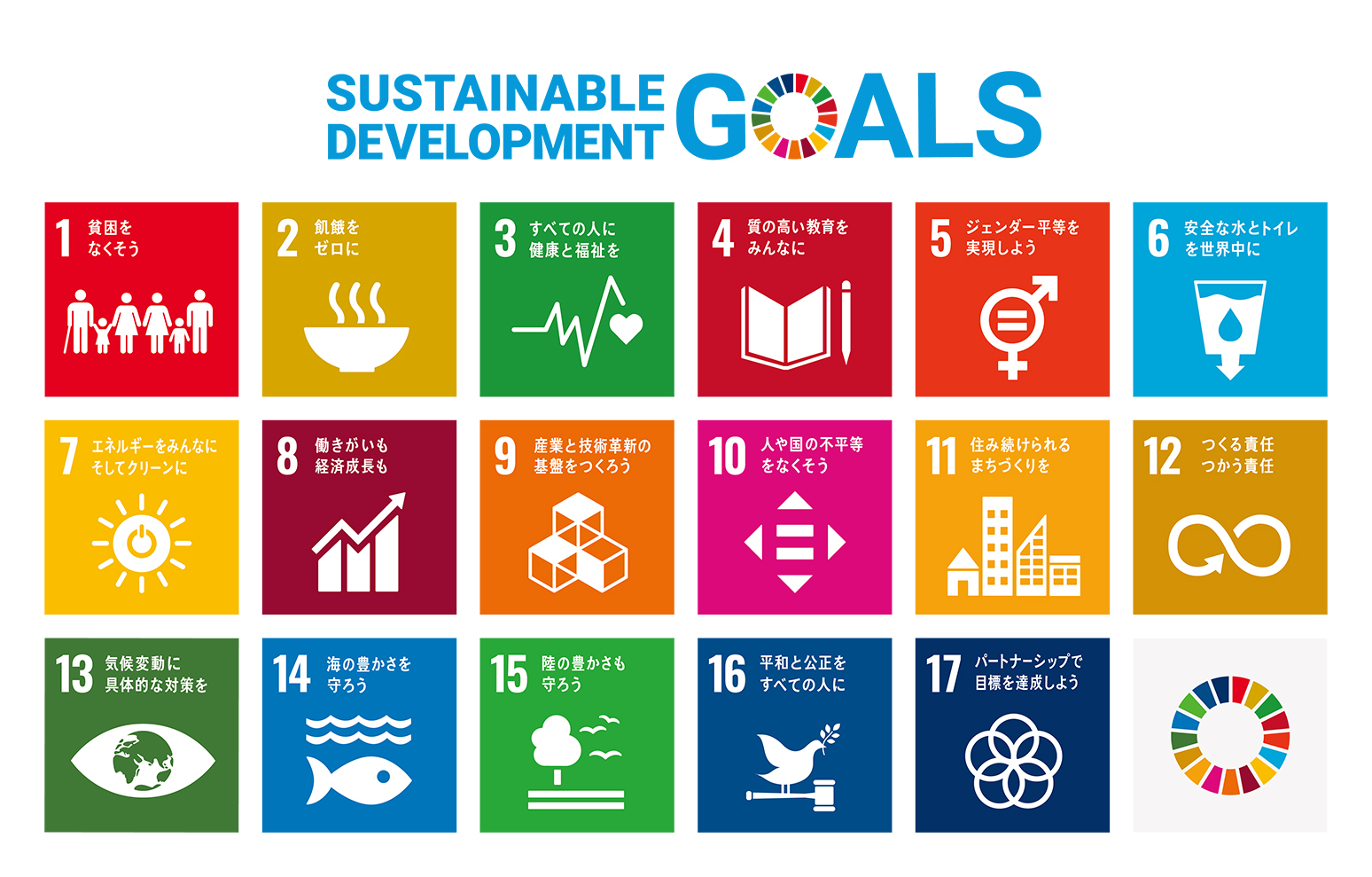Material Issues and Promotion Framework
Our Approach to Sustainability
We at the Kewpie Group aim to continue helping create a better society by contributing to food culture and health of the world through great taste, empathy, and uniqueness. We recognize sustainability initiatives as important activities and help realize a sustainable society through the practice of our Corporate Philosophy and Group Policies, and implement our initiatives as a foundation for the sustainable growth of the Group.
Kewpie Group Basic Policy on Sustainability
With an emphasis on the aspiration for "love around the kitchen table,"
we aim to address and resolve various issues through
"great taste, empathy and uniqueness."
We will create a future full of smiles by caring for people
and the environment throughout the value chain,
from product design and raw material procurement,
to production, sales and consumption.
Contributing to Food Culture and Health
- Focusing on salads and eggs as key components of dietary habits, we contribute to extending the healthy life expectancy of people around the world through the pursuit and global promotion of nutrition and health benefits.
- Through food, we support the mental and physical health of children who will create the future.
Effective Use and Recycling of Resources
- As the only manufacturer in the world that makes effective use of the entire egg, we will continue to refine our technologies and create value.
- In proposing ways of eating and utilizing uneaten portions, we aim to become a globally unique "vegetable utilization manufacturer."
- To realize a recycling-oriented society in plastics, we will promote environmentally friendly product design and collaboration with external parties.
- Recognizing that water is a limited and precious resource, we will use it efficiently and reduce the environmental impact of water intake and discharge.
- We will develop extensive technologies matching demand information with transportation and delivery data information to eliminate food loss.
Deal with Climate Change
- We aim to reduce CO2 emissions throughout the value chain, from the procurement of raw materials to product consumption.
Conservation of Biodiversity
- We will strive to minimize negative impacts on biodiversity and restore and regenerate ecosystems.
Sustainable Procurement
- In addition to safety, we will collaborate with business partners to promote stable procurement that takes into consideration environmental impacts and human rights.
Respect for Human Rights
- We promote employee diversity and inclusion, protecting the human rights of everyone involved in our business.
Adopted 2022, revised December 2024
Sustainability Promotion System
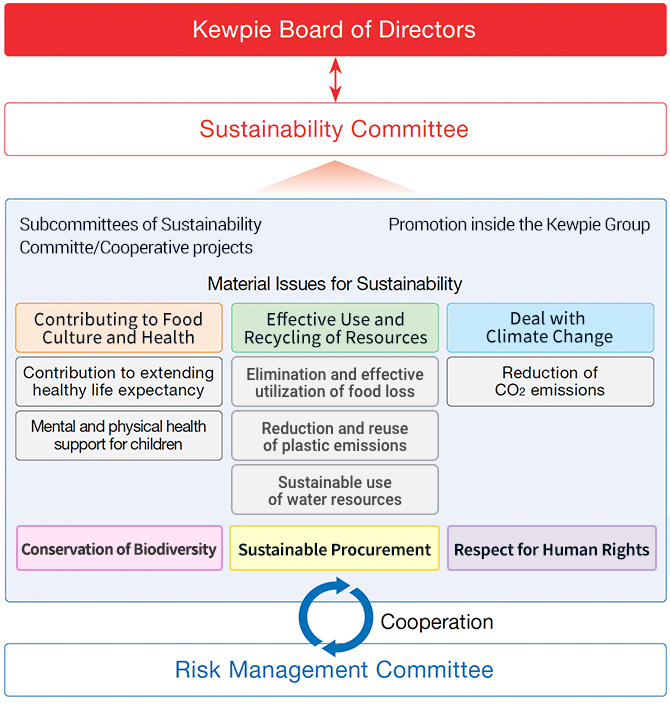
Chaired by the director in charge of sustainability, the Sustainability Committee promotes the formulation of policies and plans as well as initiatives toward the achievement of the sustainability targets.
We are working to instill and establish groupwide material issue targets and initiatives examined in subcommittees and cooperative projects.
In cooperation with the Risk Management Committee, we will respond to climate change and strengthen our business foundation.
Material Issues for Sustainability
Using backcasting and considering our aims to realize the "Kewpie Group 2030 Vision" and contribute to SDGs* from 2030, the Kewpie Group has identified the following material issues for sustainability.
- Contributing to Food Culture and Health
- Effective Use and Recycling of Resources
- Deal with Climate Change
- Conservation of Biodiversity
- Sustainable Procurement
- Respect for Human Rights
We believe that these issues are important to both contribute to the realization of a sustainable society and achieve sustainable growth for the Group. We will periodically review our priority issues in response to changes in the social and global environment.
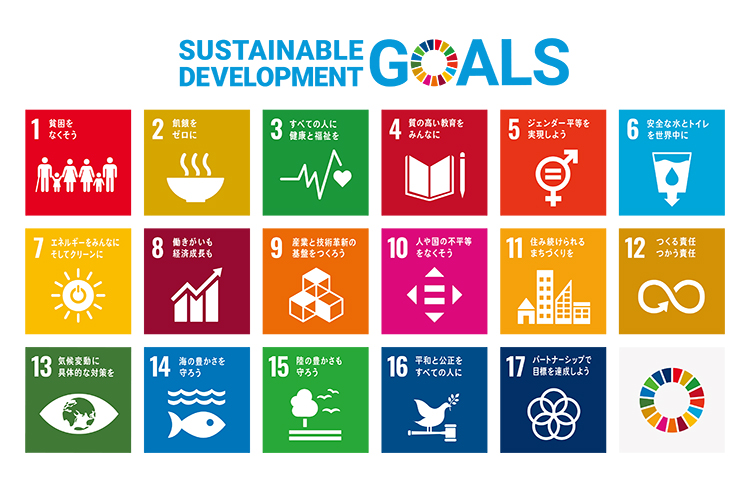

*Sustainable Development Goals (SDGs)
The Sustainable Development Goals (SDGs), adopted by the United Nations General Assembly in 2015, are a collection of 17 global goals forming a common international agenda for sustainable development, with a target date of 2030.
SDGs addressed by the Kewpie Group
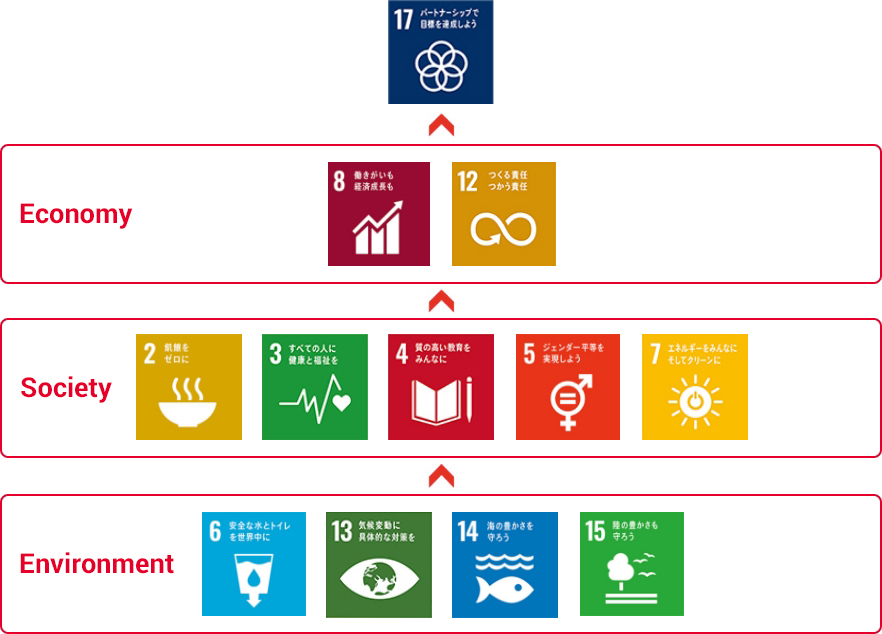
Process for Identifying Material Issues

Identification of Social Issues to be Addressed by the Kewpie Group
The Kewpie Group identifies social issues to be addressed through its business with reference to Sustainable Development Goals (SDGs), GRI, ISO 26000, SASB, and various ESG assessments.
Impact on Business and Society
We analyzed risks and opportunities in the value chain considering the entire value chain and stakeholders. Additionally, for each social issue, we evaluated stakeholder expectations and the Group's impact on society and identified material issues for sustainability.
Risks and Opportunities Analysis of our Value Chain
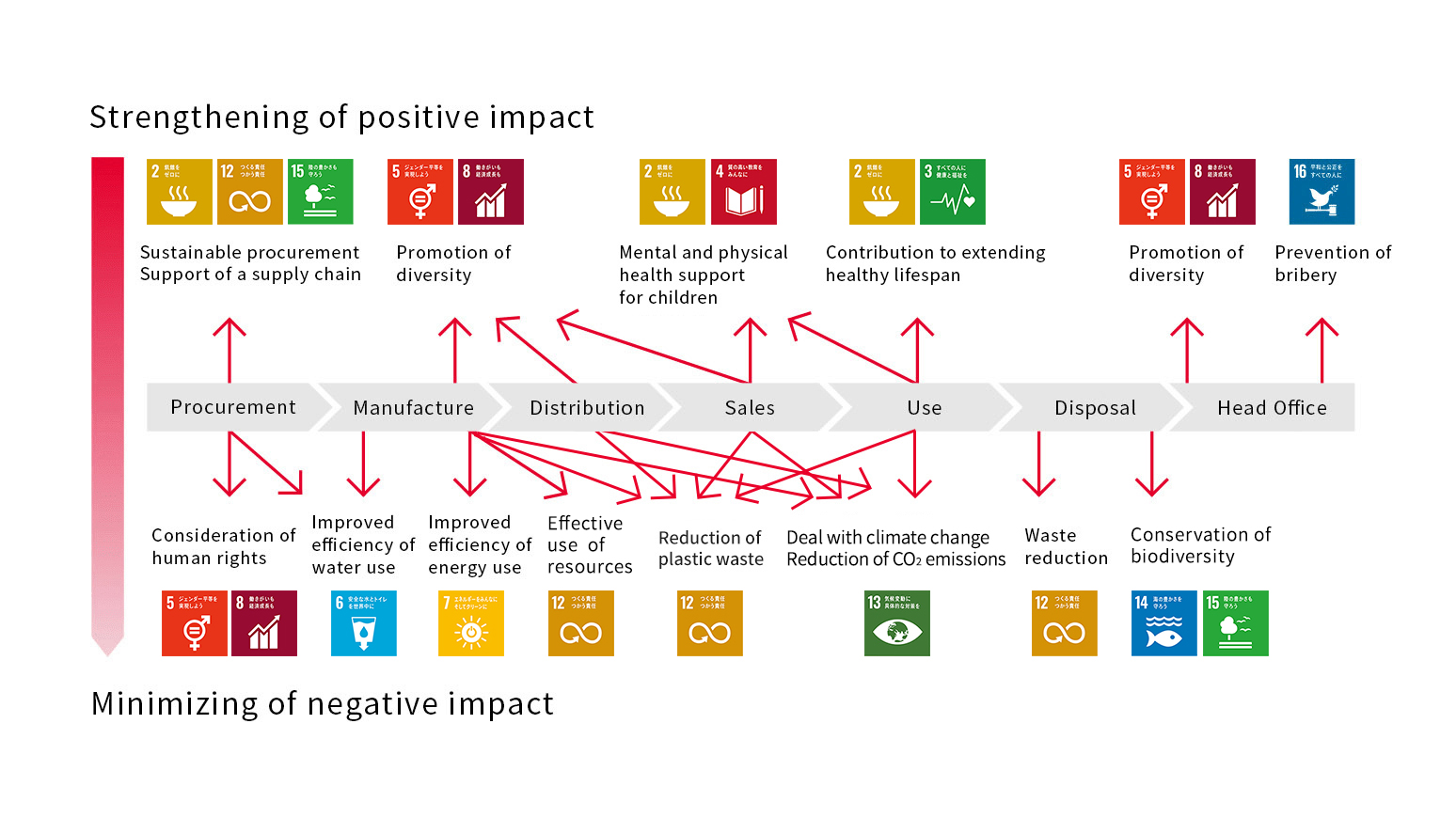
Identification of Material Issues for Sustainability
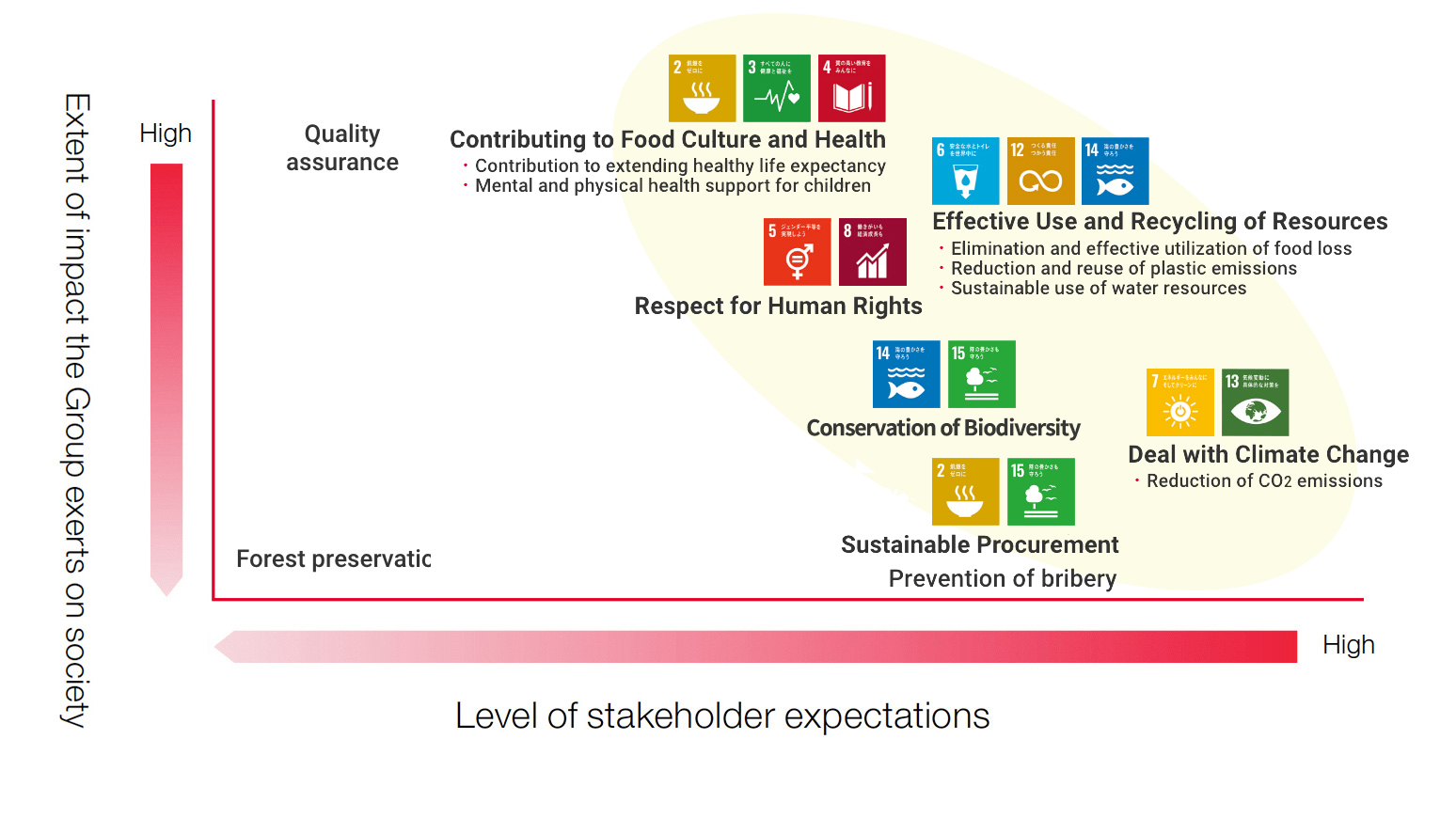
Sustainability Targets
Sustainability targets are indexes of the themes tied to key sustainability issues that the Kewpie Group will address.
All our employees are committed to achieving our goals by maintaining an awareness of sustainability, practicing Group Philosophy, and enacting Group Policies.
Sustainability Targets and Performance
| Material Issues | Initiative Theme | Indicators |
FY2024 Results |
FY2028 Target |
FY2030 Target |
|
|---|---|---|---|---|---|---|
|
Contributing to Food Culture and Health |
To contribute to our customers' healthy eating habits, we are promoting initiatives centered on the expansion of opportunities to eat salads and enhancing the added value of eggs. | |||||
| Number of children's smiles via our activities (cumulative since FY2019) |
463 thousand children | At least 800 thousand | At least 1 million | |||
|
Effective Use and Recycling of Resources |
Food waste reduction rate (compared to FY2015) | 60.6% | At least 63% | At least 65% | ||
| Effective utilization rate of unused portions of vegetables Main vegetables: Cabbage, etc. | 85.3% | At least 88% | At least 90% | |||
| Reduction rate in volume of product waste (compared to FY2015) | 65.9% | At least 70% | At least 70% | |||
| Reduction rate in volume of plastic waste (compared to FY2018) | 22.3% | At least 25% | At least 30% | |||
|
|
Water usage (basic unit) reduction rate (compared to FY2020) | 7.8% | At least 8% | At least 10% | ||
|
Deal with Climate Change |
Reduction rate in CO2 emissions (compared to FY2013) | 44.4% | At least 46% | At least 50% | ||
|
Conservation of Biodiversity |
100% sustainable paper procurement by 2025(Containers and packaging, booklets, promotional products, office supplies) | 98.4% | 100% | 100% | ||
|
Sustainable Procurement |
Promote Fundamental Policy for Sustainable Procurement in cooperation with business partners | |||||
|
Respect for Human Rights |
Promote the Kewpie Group Human Rights Policy to respect the human rights of all people involved in our business | |||||
Note: The "food waste reduction rate" indicator includes the "effective utilization rate of unused portions of vegetables."
Sustainability targets are domestic figures.
We changed our indicator for 'contribution to extending healthy life expectancy' in FY2025.
We reviewed the calculation data for the base year regarding the 'Reduction rate in CO2 emissions' and the figures now reflect retroactive application in FY2025.
Promoting Awareness Among Employees
We believe the creation of a sustainable society and sustainable corporate growth requires each and every employee to understand and empathize with our ideas and policies.
In-House Bulletins
We use publications such as integrated reports and books on communication to educate employees. We also disseminate information on sustainability via in-house tools such as the Kewpie Group newsletter "iQP" and the sustainability email newsletter "NewS."
Kewpie Group Official Blog
Launched in March 2007 to communicate our social and Protect the Earth's Environment to the public, Kewpie Group Official Blog (formerly known as the CSR Blog) aims to make the concept of sustainability resonate with each and every employee through articles written by employees actually working within the group.



